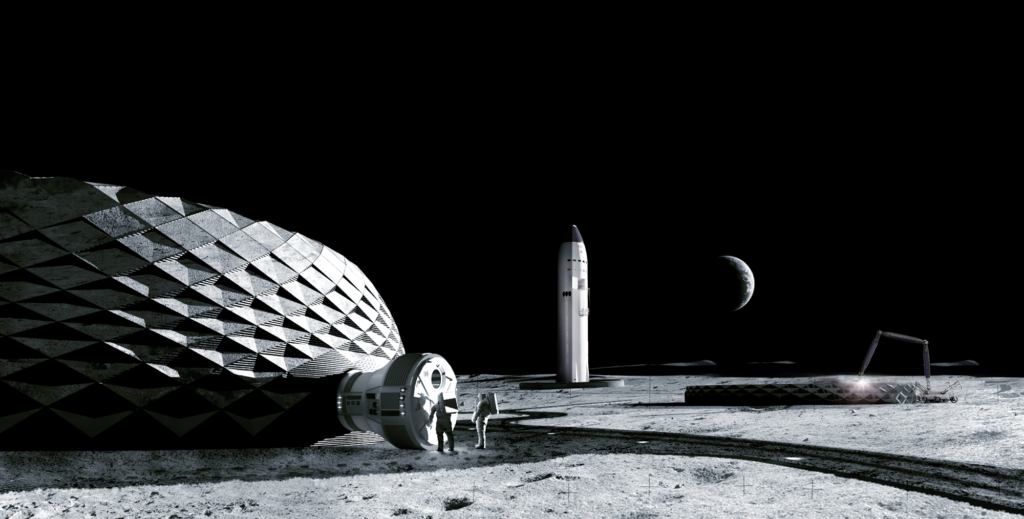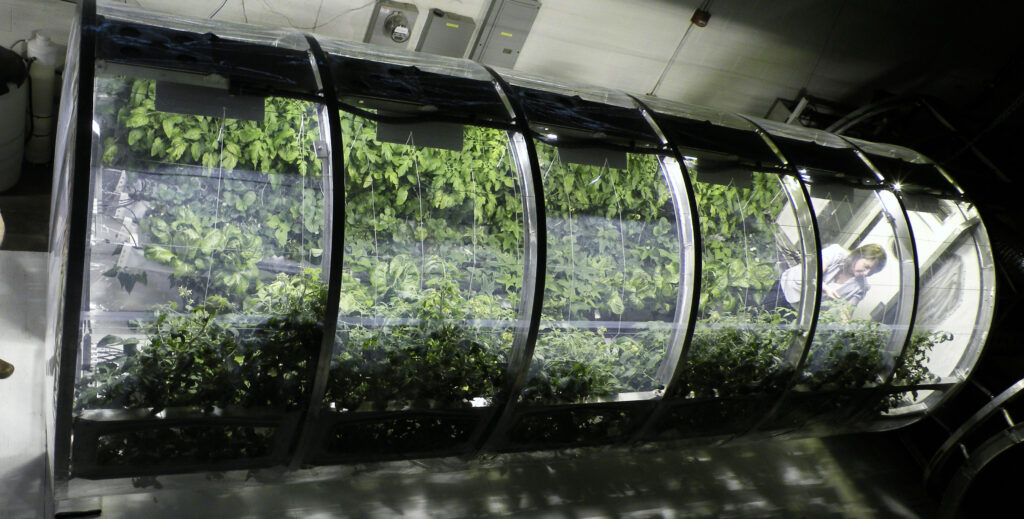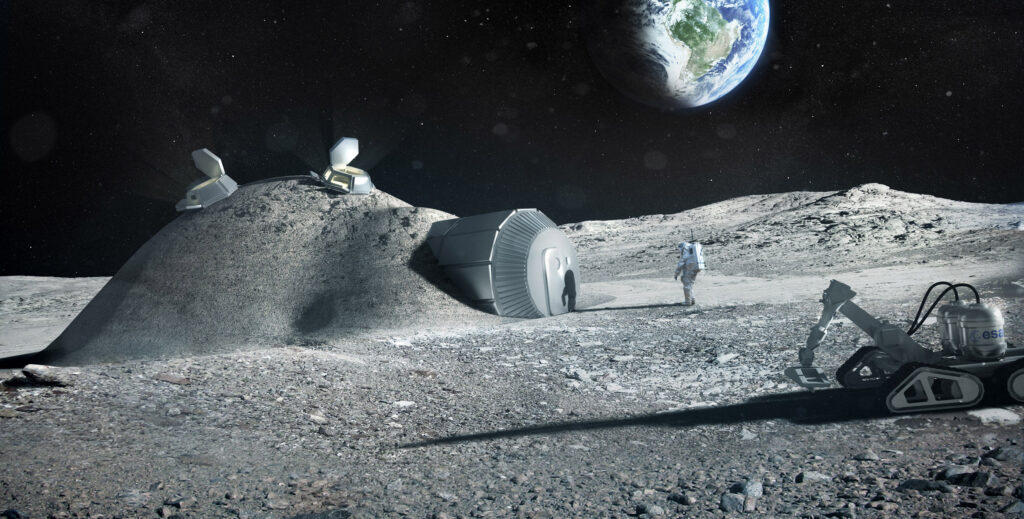Humanity is preparing to return to the Moon as part of the NASA-led Artemis mission. It will happen after 50 years since Apollo 17 first landed on the surface of a natural satellite. The new mission is expected to be the first step toward full exploration and colonization of the Moon. In addition to NASA, other aerospace agencies are involved, including ESA, the Japanese Aerospace Exploration Agency, the Canadian Space Agency, and many private companies: SpaceX, Lockheed Martin, and Airbus.
But these days, lunar exploration is no longer just a matter for the “Big guys” with multi-billion dollar budgets. Non-gravity food production, oxygen production systems, shuttles for travel between Earth and the Moon, and many other things are now being developed by young startups. Here’s a list of the seven promising companies that will accelerate the exploration of the natural satellite.
Accommodation and Life support

The first thing the colonizers will have to think about when they set foot on the surface of the Moon is housing and oxygen. Two startups — the American ICON and the Israeli HELIOS — promise to help the astronauts.
ICON
Icon is a company from Austin, Texas. The startup specializes in rapidly constructing residential homes using proprietary 3D printers. Initially, Icon only dealt with real estate on Earth, and the company became famous for its patented Vulcan printers, which build one-piece houses in 24 hours. But over time, the technology attracted NASA’s attention, and Icon is developing the Lunar Surface Construction System.
The startup has received $57.2 million from the space agency and has become a participant in the research and development of space-building systems for lunar exploration.
“To change the space exploration paradigm from ‘there and back again’ to ‘there to stay,’ we’re going to need robust, resilient, and broadly capable systems that can use the local resources of the Moon and other planetary bodies. We’re pleased that our research and engineering to date has demonstrated that such systems are indeed possible, and we look forward to now making that possibility a reality”
ICON CO-FOUNDER AND CEO JASON BALLARD
HELIOS
As for oxygen, a younger company, HELIOS, based in Tel Aviv, will help the colonizers. The startup claims its technology can efficiently extract oxygen from the lunar regolith, which consists of 45% of the vital element. Helios uses a unique process to do this, which is called molten regolith electrolysis. The regolith is melted at a heat of 1,600 degrees Celsius before an electric current is passed through the lava, releasing the bubbling oxygen. In this way, Helios will provide the colonists with an ample supply of oxygen even if the inhabitants of the Moon lose contact with Earth.
In addition, oxygen produced by molten regolith electrolysis will make space travel and delivery more affordable. Oxygen constitutes about 65-80% of the mass of rocket fuels; thus, refueling in earth orbit will drastically decrease the cost of future space missions. Soon, the startup wants to establish the required infrastructure and utilities for future human colonization of the Moon. According to Helios, the oxygen will be transported to earth orbit to fuel space vehicles traveling further away to outer space, and autonomous construction robots will do this work.
The startup has been awarded funding from the Israel Space Agency and the Energy Ministry. Helios’s tech will fly on the first three LSAS missions to the lunar surface starting in 2025. This will be the first time the company will test its systems in natural conditions.
Food and Health

When the first steps are taken, settlers must think about long-term survival. Firstly, of course, it is a question of food, and secondly of health. Two other technology startups, GreenOnyx and EXOM, should help with this.
GreenOnyx
GreenOnyx is an agro-tech startup that has developed its platform for cultivating and packaging crops. The company from Tel Aviv claims that its production efficiency is equivalent to the annual yield of a 3,000 sqm green vegetable field. And, more importantly, for colonization, the technology can work outside of Earth.
GreenOnyx already plans to test its platform in space soon. In that project, the startup will grow a water-based lentil plant under microgravity conditions in an autonomous growing facility. The leaves will be tested as food in space and produced in a controlled group where their growth rates will be analyzed.
EXOM
But food is not the only element of survival that the Moon inhabitants will have to consider. The colonizers will also face harsh environmental weather, high radiation, and psychological difficulties. All these issues can be solved with Exom — an Israeli startup developing several products that solve problems for people outside the Earth.
To protect against ionizing radiation, which is lethal in space and other planetary bodies, Exom offers an environmentally friendly and harmless roof-like layer. Dust and suspended airborne regolith threaten electrical, mechanical, and human health. And the Startup’s technology removes charged regolith and dust at the entrance to the environment.
In addition to physical protection, the startup also promises information and psychological support for future colonists. For the former, Exom will provide IoT sensors that collect data on weather conditions, and for the latter, a VR-based psychological support platform. The startup also plans to develop a recognition system to analyze the settlers’ moods and needs. Thus, Exon will make life on the Moon more comfortable and stable.
Exploration

Once the colonists have decided on what to eat, how to breathe, and how to protect their health, they can think about useful activities on the lunar base. Robots will automate much work, but the Moon will still need specialists to monitor the advanced algorithms. Lunar Outpost, WeSpace Technologies, and Space Mining Technologies promise to provide these systems.
Lunar Outpost
Lunar Outpost is a Colorado startup that wants to turn the space economy into “the largest market in human history”. The company is developing rovers and other technologies for space applications. Using its systems and sensors on the surface of the Moon, Lunar Outpost intends to benefit both space exploration and the people of Earth. The startup is already working with NASA and plans to carry out several space missions to the moon next year.
WeSpace Technologies
At the same time, WeSpace Technologies, based in Ra’anana, Israel, develops autonomous flying robotic systems, also known as thruster-propelled drones or hoppers. This technology is also designed for lunar missions. WeSpace wants to provide technology for partners who wish to explore the Moon and extract its resources.
According to the startup’s developers, for the first time with the WeSpace robotic systems, access to the underground world of the moon – the lava tubes and permanently shadowed areas – will open up. And the lunar surface will open up many opportunities for future deep-space explorers.
Space Mining Technologies
And the last company in our story is Space Mining Technologies, founded in the UK in 2017. The startup covers a wide range of technologies, from techs for extracting water from the surface of other planets to space systems engineering. In particular, Space Mining is working on a platform for autonomous rover navigation and an AI service for designing complex rovers called Armstrong.
These and other technologies, as represented by WeSpace, will provide critical resources and technologies enabling sustainable space exploration and future settlements on the Moon and Mars.
What’s Next?
We have listed a few promising startups among the many companies seeking to bring humanity closer to establishing the first colonies on the Moon. These days, dozens of enthusiasts are building rockets, rovers, life support systems, and more technologies that will accelerate the exploration of the natural satellite. More importantly, the Moon is not our final destination but only a starting point for settling others inside and outside the solar system.

